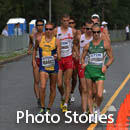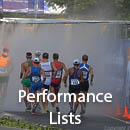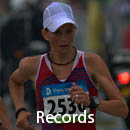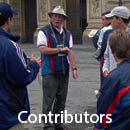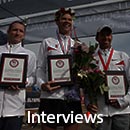RAY SHARP
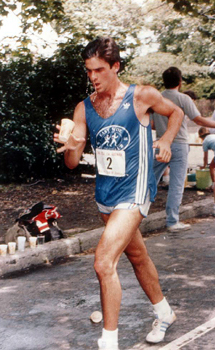
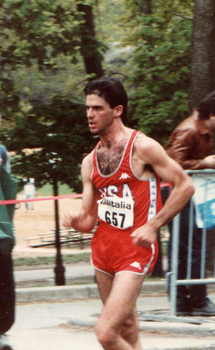
Birthday: November, 25 1959
Current Residence : Kenosha, WI
Hometown: Houghton, MI
College: University of Colorado
PRS
Outdoors
20 km - 1:24:48
50 km - 4:21:06
Indoors
1 mile - 5:46
Ray Sharp started his athletic career as a runner. Competing for 4 years on the high school cross country and track teams, Sharp developed sore knees. Like many, he gave the race walk a try at the Junior Olympics. Improving rapidly, Sharp went from a 10:17 mile in his first race down to a 7:06 by nationals. By the following year, Sharp moved up in distance and raced the 10K Junior Nationals. Winning in a time of 50:54, he qualified with Mike Morris to race against the USSR, Germany, and Great Brittan. International experience agreed with Sharp, on the trip he improved his 10K time all the way down to 46:53.
One of the benefits of elite race walking are the unique experiences training and racing provide. Sharp learned early to train and race with the best. From February to April of 1980, Sharp trained and lived in Mexico City. Sharp recalls, “ The experience was quite intense and satisfying, both in terms of the hard training and as far as living in another culture and interacting with many top athletes from Europe and the Americas.”
he training paid huge dividends for Sharp. He returned to the US and won the 30K Nationals, hopped back to Mexico and broke the American record for the 1 hour (13984 meters). Life in Mexico City was not all work and no play. After the race, a young Ernesto Canto (Future Olympic Gold Medallist) hustled Sharp and his teammates into the back of a pickup and they cruised from bar to bar, where women danced with them for pesos. All the while, a police car followed discreetly behind them to make sure they were all safe. Sharp says that he’s never felt more alive than in the spring of 1980, when all that mattered was becoming the best walker in the world.
While not becoming the best in the world, Sharp made a great run at it. One of the fastest young American race walkers of the 1980s and winner of 14 senior national titles ranging in distance from 2 miles to 100 kilometers was long on potential but short on consistency in major domestic races. The solidly built Kentuckian compiled a record of strong performances on foreign soil while competing in two IAAF championship races (Indoor and Outdoor, 1987), two World Cups (’81,’87), two Pan Am Cups (’86, ’90), the inaugural Goodwill Games (1986) and many other international meets. Sharp’s career will be remembered for his three failed Olympic Trials bids, but also for the way he could take charge of an indoor race with a trademark final-lap burst of speed, and for the intensity and zeal he brought to every race and workout.
Interestingly, both Sharp and Heiring remember the indoor races with fondness. In the early 80’s the two battled back and forth. Each won their share and more often than not, some kind of record went to the winner. Several races were true photo finishes decided by a mad rush, elbows flying, and a lean at the tape. They left their competition on that track thou, always going out together afterward to celebrate their efforts.
Sharp was the star of one of the best documentaries of race walking ever made, "The Long Walk to the Olympics." Sharp did not intend to be a film star. He was participating at a training camp in Wellington, FL and competed at the 15K Nationals at the end of the camp. As a joke a number of walkers had printed "Team Unattached" racing singlet to indicate they needed a sponsor. Sharp wore one of them, and the rest as they say is history. He got a sponsorship from Mazola and a film gig to boot.
Sharp retired from competition in 1991 following a three-year struggle with chronic fatigue syndrome. Now healthy again, he lives in Houghton, Michigan, near the shore of Lake Superior, with his wife, Wendy, and three children. The Sharps enjoy trail running, triathlons and Nordic ski racing and recently tried a comeback. Sharp raced well at the 2004 Penn Relays, but fell short of his bid to qualify for the 2004 20K Olympic Trials.
1987
3rd - 1:27:00
1986
3rd - 1:24:58
1983
9th - 1:27:18
1982
2nd - 1:26:48
1981
7th - 1:32:30
1980
8th - 1:29:45
1990
9th - 4:31:56
1981
5th - 4:21:06
1979
10th - 4:28:41
1983
2 mile - 12:24.92
1981
2 mile - 12:37.65
1988
5K - 20:56.50
1987
25K - 1:51:25
1983
35K - 2:55:00
1982
40K - 3:27:31
1981
5K - 20:47.52
30K - 2:25:44.5
1980
5K - 20:27.8
10K - 42:42.9
15K - 1:10:12
25K - 2:02:45
30K - 2:21:03
100K - 10:59
20K World Championships
1987 - 21st - 1:27:06 - Rome, Italy
20K World Cup
1987 - 45th - 1:27:01 - New York City, NY
1981 - 28th - 1:32:30 - Valencia, Spain
20K Pan Am Cup
1987 - 8th - 1:24:58 - St. Leonard, Canada
50K Pan Am Cup
1990 - 11th - 4:51:35 - Xalapa, Mexico
